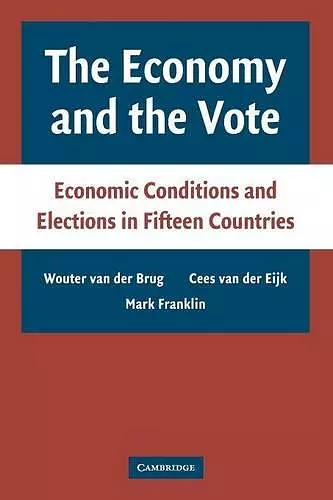The Economy and the Vote
Economic Conditions and Elections in Fifteen Countries
Cees van der Eijk author Mark Franklin author Wouter van der Brug author
Format:Paperback
Publisher:Cambridge University Press
Published:30th Apr '07
Currently unavailable, and unfortunately no date known when it will be back
This paperback is available in another edition too:
- Hardback£75.00(9780521863742)

This book estimates he effects of economic conditions on the behaviour of individual voters and on election outcomes.
This book estimates the effects of economic conditions on the behaviour of individual voters and on the outcomes of 42 elections in 15 countries. The conventional wisdom that poor economic conditions hurt governing parties is too simplistic and it does not hold for junior parties in coalition governments.Economic conditions are said to affect election outcomes, but past research has produced unstable and contradictory findings. This book argues that these problems are caused by the failure to take account of electoral competition between parties. A research strategy to correct this problem is designed and applied to investigate effects of economic conditions on (individual) voter choices and (aggregate) election outcomes over 42 elections in 15 countries. It shows that economic conditions exert small effects on individual party preferences, which can have large consequences for election outcomes. In countries where responsibility for economic policy is clear, voters vote retrospectively and reward or punish incumbent parties - although in coalition systems smaller government parties often gain at the expense of the largest party when economic conditions deteriorate. Where clarity of responsibility for economic policy is less clear, voters vote more prospectively on the basis of expected party policies.
"Van der Brug and company hit conventional wisdom hard. By their analysis, the economy, after all, influences the voter decision relatively little. The investigation, unique in its construction and provocative in its conclusion, begs to be read by comparative election scholars." Michael Lewis-Beck, F. Wendell Miller Distinguished Professor of Political Science, University of Iowa
"The Economy and the Vote is an important book on an important subject. The authors develop a simple but powerful theoretical model that treats the vote decision as a two-stage process, where party preferences and party choice are taken separately. They then provide a truly exhaustive empirical analysis of the ways in which characteristics of parties and party competition structure economic effects on party preferences and, ultimately, the vote. The end result is compelling; it confirms and illuminates what we know to be true, and resolves puzzles that have eluded explanation until now. This book is certain to engage scholars for years to come." Christopher Wlezien, Temple University
"One of the important contributions of this book is a recasting of economic voting theories in a more comprehensive two-stage model of voting behavior...this book provides powerful methodological and theoretical guidance for for students of voting behavior and an important reminder to bring the competitive dynamic back into our models of voting behavior." Matthew M. Singer, Journal of Politics
ISBN: 9780521682336
Dimensions: 229mm x 150mm x 15mm
Weight: 320g
246 pages